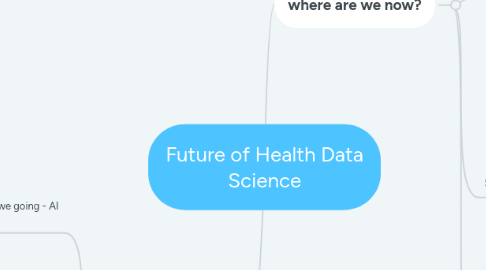
1. The Way Ahead
1.1. Overall landscape - where are we going - AI as gamechanger?
1.1.1. What is going on? What is the excitement in AI all about? Technology development leads to game changer in healthcare?
1.1.1.1. All areas in the AI value chain have relevance in healthcare
1.1.1.1.1. Stress on the next lap - look beyond predictions. Decision support and even Cognitive - able to respond to context, environment, etc
1.2. Other important solutions to advance the data science agenda
1.2.1. TriNetX Pilot to foster collaborations with external parties
1.2.2. Roadmap for the national platform
1.3. Important not to neglect the governance on AI
1.3.1. Fairness
1.3.2. Accoutability that requires transparency - what is "Opening the black box"?
1.3.3. Ethics is difficult and very broad
1.4. Important also the ability to deploy resources wisely
1.4.1. Most effective option could be to embed data science experts in the domains
1.4.1.1. Training is important
1.5. Reiterate that Data Science models needs to go beyong validation to real implementation for improving outcomes
1.5.1. Testbedding and scaling up is important
1.5.2. Rigorous validation is important - implementation science studies to go beyond just pure model validation and simple accuracy metrics
2. where are we now?
2.1. Data and Data Science plays a central role for both patients and providers in the healthcare system
2.1.1. EMR; iOT; imaging and lab results; genomic data; insurance; environmental etc
2.1.2. Researchers; Data Scientists; Statisticians; HSR Researchers; health economists all play critical roles
2.2. Data Science is not Analytics. Science is the key, not Data
2.2.1. Rigorous evidence based approach that are statistically sound. Technically robust
2.2.2. Data Science needs critical Scientific Thinking and Technically sound and robust methods.
2.2.2.1. Implementation requires rigorous study design and statistical methods as well as defensible health economics evaluation
2.3. HSR Ecosystem in SingHealth - DUke-NUS AMC
2.3.1. Data and Implementation Science most relevant in the healthcare side
2.3.1.1. Data Science is not solely IT or Technical
2.3.1.2. Data Science needs to be coupled with sound implementation studies, deep stakeholder engagement, rigorous economic evaluation as well as sound risk management principles
2.3.1.3. Enterprise Deployment needs to consider sustainability and stakeholders buy-in. Also scaling up and facilitate governance
2.3.1.3.1. Elaborate on governance later
2.3.2. Key Data Science resource at the cluster level is the HSRC Data Science Core
2.3.2.1. Don't just do projects, but look at Data Governance and Policy Formulation, Infra Planning, Development and Support and Data Science Capability Development
2.4. Examples of Data Science project classes
2.4.1. Disease Progression models; Disease prognosis (images; unstructured notes); Clinical Quality; Financing models, Value Driven Outcomes, etc
2.4.2. Differentiated by size of data and analytical complexity
2.4.2.1. analytical complexity may increase when we consider prescriptive and cognitive problems. Prediction with decision making; sensing, and even general intelligence in supporting decisions
2.4.2.2. Size of data as yet may not be really big data. But when there is streaming iOT data, then healthcare will have to learn how to deal with them on a real-time basis when data is being generated at high frequency and volumes
2.5. SingHealth Analytics Infrastructure
2.5.1. Local Data Warehouse
2.5.2. National BRAIN Infrastructure
2.5.3. Data is just one aspect. Ability to deal with them leverages on multiple discipline. Comp Science, Engineering, Business, Psychology; Economics; Operations Research; etc
2.6. Data and Capabilities; What about Governance?
2.6.1. Recent BReach; Governance in data sharing - Google; Protection of exfiltration; data loss; etc
2.6.2. UK Information Commission
2.6.3. What is SingHealth doing
2.6.3.1. Cluster Data Management Policy
2.6.3.2. Research using RWE and clinical/operational data - consent/waiver of consent - still requires protection
2.6.3.2.1. Access Restricted Cluster
2.6.3.3. Deidentification SOP to respond to HBRA
2.6.3.3.1. Not straigghtforward removal of PHIs
2.6.3.3.2. Responsibility on residual risks that remains have to be understood, acknowledged and accepted by PI and institutions
2.6.3.4. Current Status
2.6.3.5. Look back and Look Ahead - where are we going

